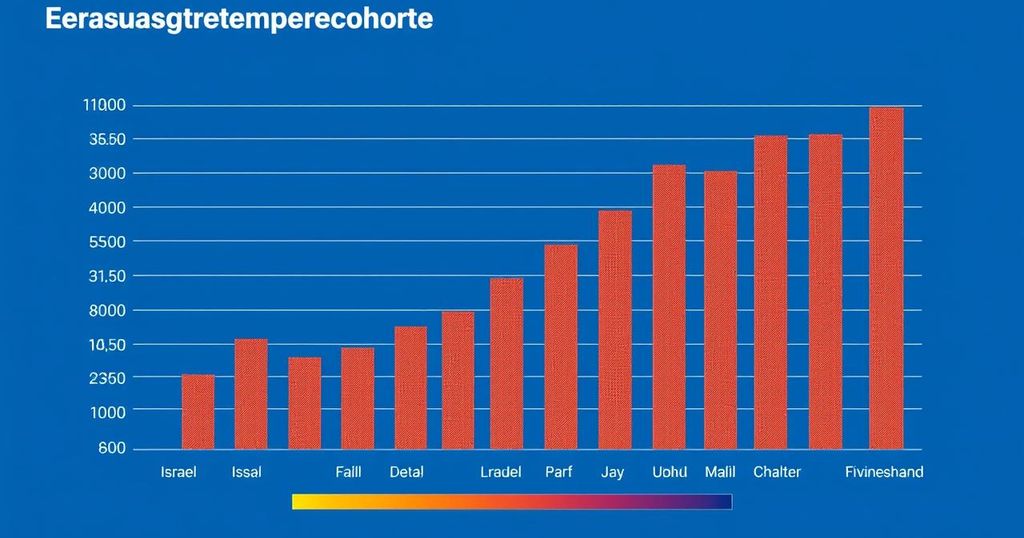In the weeks leading up to the presidential election, President Biden and Vice President Harris are confronted with escalating violence in the Middle East, particularly Israel’s military actions in Gaza and Lebanon, complicating their political landscape. The Biden administration’s recent policy reversals and the potential loss of support from Arab American voters add significant pressure as they navigate this contentious issue.
In the closing weeks of the presidential election, President Joe Biden and Vice President Kamala Harris anticipated that the escalated violence in the Middle East would fade from public concern; however, recent actions by Israel have greatly complicated this expectation. Prime Minister Benjamin Netanyahu has escalated military operations in Gaza, launching a renewed bombing campaign and a ground invasion into Lebanon, with intentions to target Iran’s military capabilities following missile strikes against Israel. This rapid escalation has left the Biden administration in a precarious position, as officials struggle to navigate a shifting landscape of international expectations while avoiding alienating key voter demographics during a critical electoral period. The Biden administration’s fluctuating stance—initially calling for a cease-fire in Lebanon before publicly backing Israel’s operations—has led to confusion and anxiety among American allies in Europe and Arab nations. Frank Lowenstein, a prominent figure in Biden’s camp, articulated the administration’s dilemma, stating, “They clearly want to avoid any public confrontation with Netanyahu over Lebanon or Gaza that could result in blowback from Israel’s supporters before the election.” Concurrently, there is a palpable anxiety regarding the potential loss of Arab American votes in crucial swing states. The U.S. administration has expressed its desire to see increased humanitarian aid access to Gaza but has carefully avoided any overt confrontation with Netanyahu’s policies. A recent confidential letter from Secretary of State Antony Blinken and Defense Secretary Lloyd Austin urged Israel to permit more humanitarian assistance, which was quickly downplayed by administration officials as not intended to be perceived as a threat. Meanwhile, the situation globally remains tense as Israeli airstrikes continue in Lebanon, heightening fears of a broader regional conflict.
Currently, the Israel-Gaza conflict has intensified significantly with President Biden attempting to balance support for Israel while addressing the humanitarian consequences of the ongoing war. The situation is complicated further by the impending presidential election, wherein Biden and Harris must navigate the political implications of their administration’s foreign policy, particularly concerning Arab American voters who are increasingly dissatisfied with U.S. support for Israel amid civilian casualties in conflict zones. Historical animosities in the region and a lack of clear outcomes from U.S. diplomatic efforts contribute to the challenges faced by the Biden administration as it attempts to reconcile complex international dynamics with domestic electoral realities. The backdrop of escalating violence includes a history of hostility between Israel and Hezbollah in Lebanon as well as broader regional implications that affect U.S. foreign relations and domestic political calculations. As Israel continues military operations in the region, U.S. officials reflect on the effectiveness of their strategies, with criticisms arising regarding the lack of a coherent exit strategy from the conflict that may undermine long-term U.S. objectives in the Middle East.
The ongoing conflict in the Middle East is presenting significant challenges for the Biden administration as it seeks to manage international relations while preparing for the electoral season. Given the urgency of the humanitarian situation and the political fallout with key voting blocs within the United States, the administration finds itself in a delicate balancing act. The evolving dynamics in Israel and Lebanon pose critical questions about the future of U.S. involvement in the region and its implications for both domestic politics and international stability.
Original Source: www.washingtonpost.com







